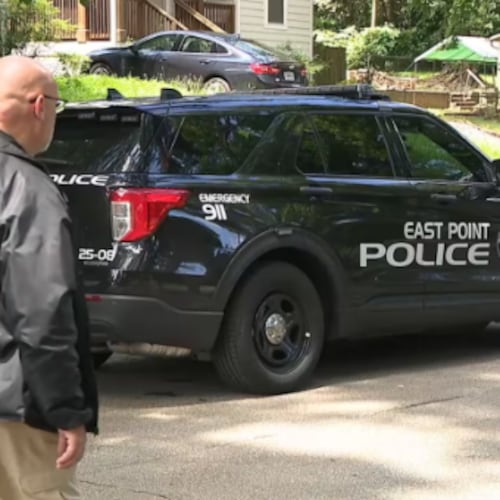DeKalb County public safety director was tight-lipped about some details surrounding the shooting of two officers Friday but one point Cedric Alexander drove home was they almost died.
“I can’t imagine what was going on in those officers minds,” Alexander said. “On this day lives were threatened, and it is only by the grace of God, it could have been worse.”
Alexander, who advised the police department in Ferguson, Mo., in the aftermath of a controversial officer shooting, used the wounding of a rookie and a relatively new officer to demonstrate the dangers facing cops who nationwide now find their actions under a spotlight from an increasingly skeptical public.
“Police officers in this community and across this country do a very dangerous job each and every day,” Alexander said.
Just before 7 a.m. Friday officers Devon Perry, 29, Tony Luong, 26, were among several responding to a 911 call about a home-invasion armed robbery in Colony Ridge apartments near Glenwood Road and Austin Drive.
Perry was ending his shift and Luong was starting his when two gunmen emerged from an apartment, saw the police and opened fire without hesitation, Alexander said.
At least one gunman was firing an fully automatic AK-47 assault rifle. A bullet struck 4-year-veteran Perry in the calf and Luong, hired a year ago, took a bullet in the thigh, Alexander said.
“It was a shootout face to face between the officers and the bad guys,” Alexander said. “From what we can gather both of them were very much armed.”
Police shot one gunmen, a 39-year-old man who was operated on Friday and in critical condition. They wounded a second gunman who ran, prompting a four-hour manhunt.
Shortly after the shooting, scores of officers from several police agencies descended to lock down that section of south DeKalb. Officers fanned out, blocking off streets and for a time closing part of Interstate-285 as well as several blocks of Glenwood Road. Six area schools were put on alert.
Heavily armed SWAT teams arrived along with armored vehicles and K-9 handlers. Around the country such displays are now being used by critics to question the militarization of police. On Friday Alexander used the response as an example of effective policing that ensured public safety.
He repeatedly pointed out military-style weapons were used against police.
He noted that in January 2008 two DeKalb officers were killed nearby. Officer Ricky Bryant Jr., 26, and Officer Eric Barker, 33, were working an off-duty security job at an apartment complex after getting into a fight with William Maurice Woodard, then 26. Woodard was later sentenced to life without parole for the killings.
Friday police dogs picked up the scent of the wounded fugitive, tracking him across I-285 as helicopter crews scanned the ground below.
“The canine has the scent,” Capt. Steve Fore said mid-morning. “”We have canines on the ground and we have air support overhead.”
Four hours after the shooting, a K-9 handled by a Doraville police officer found the 29-year-old man hiding in some woods by a cemetery on Arthurs Court Drive. The man again tried to flee but the dog didn’t let him get far and bloodied him with a bite.
Alexander didn’t identify the arrested men but said they would face charges involving the home-invasion armed robbery and aggravated assault. It was unclear Friday if the men had other accomplices and how many automatic weapons were used.
Police recovered one handgun and one AK-47, Alexander said. Perry was treated and released for his wound and Luong had surgery for his thigh wound. He is expected to recover fully, police said.
The robbery victims weren’t injured and were in fact questioned themselves Friday on what prompted the robbery, Alexander said.
"That location at that apartment we suspect — we suspect at this point — may have had some other activities going on inside," Alexander said. "That is still to be determined, and I don't want to make any concrete statements until we know."
It is these uncertainties police face — traffic stops that end with gunfights with felons, arriving at crimes where they may be protecting bad guys from worse guys — that can tighten tension between cops and communities.
Alexander, a nationally respected lawman with a finely tuned political antenna, went to Ferguson in August to consult on how the nearly all-white police force could improve its relations with the majority black community. But as president of the National Organization of Black Law Enforcement Executives, he understands the public often fails to appreciate the police.
”I think it’s important to note here,”Alexander said, “that we have to support our law enforcement, support our officers as well, because they do a very dangerous job.”
Staff writers Mike Morris and Alexis Stevens contributed to this article.
About the Author
The Latest
Featured

